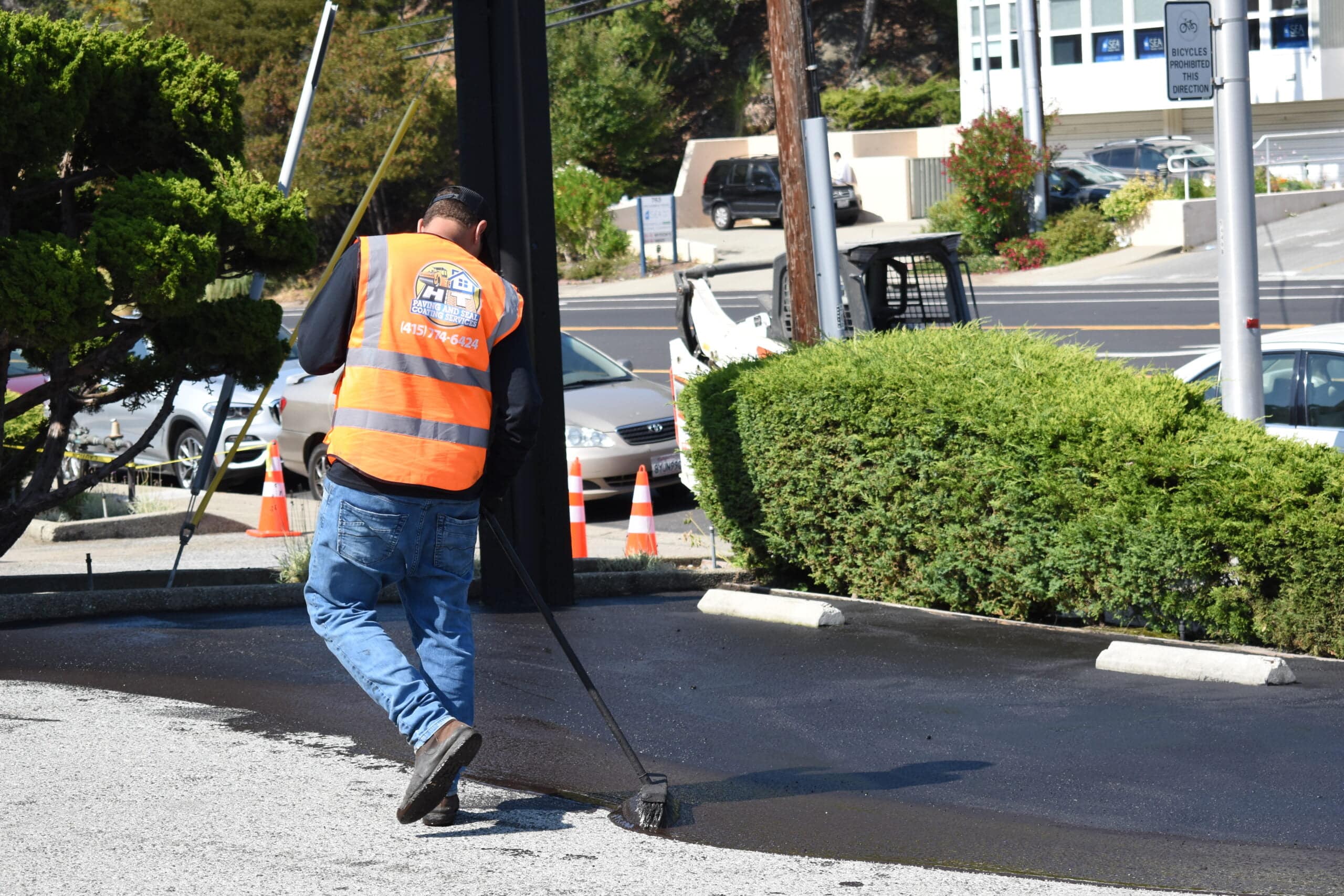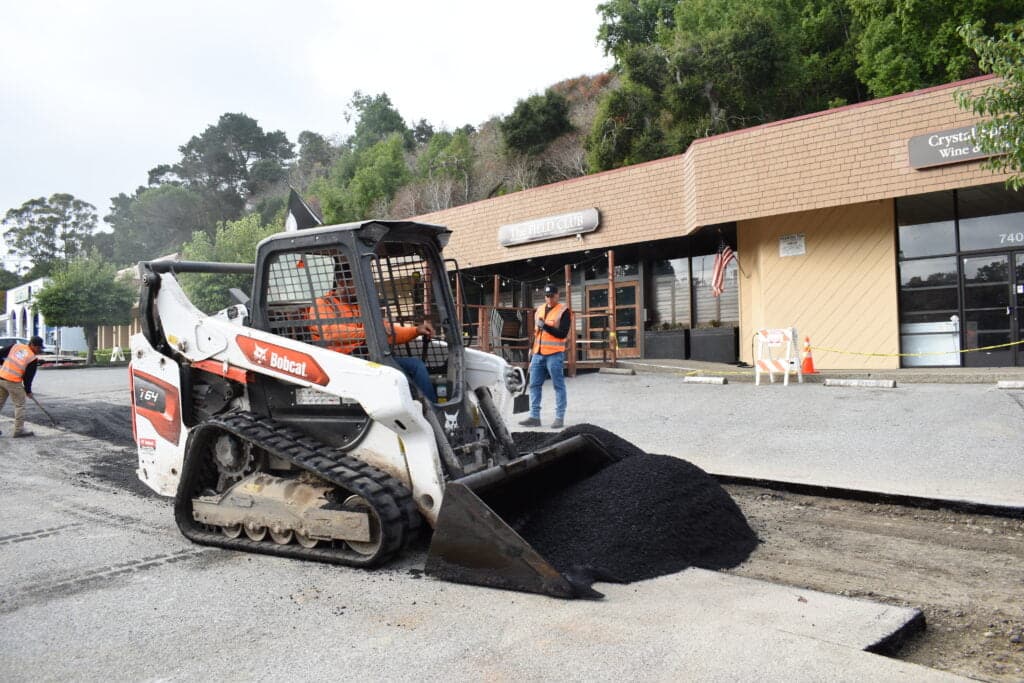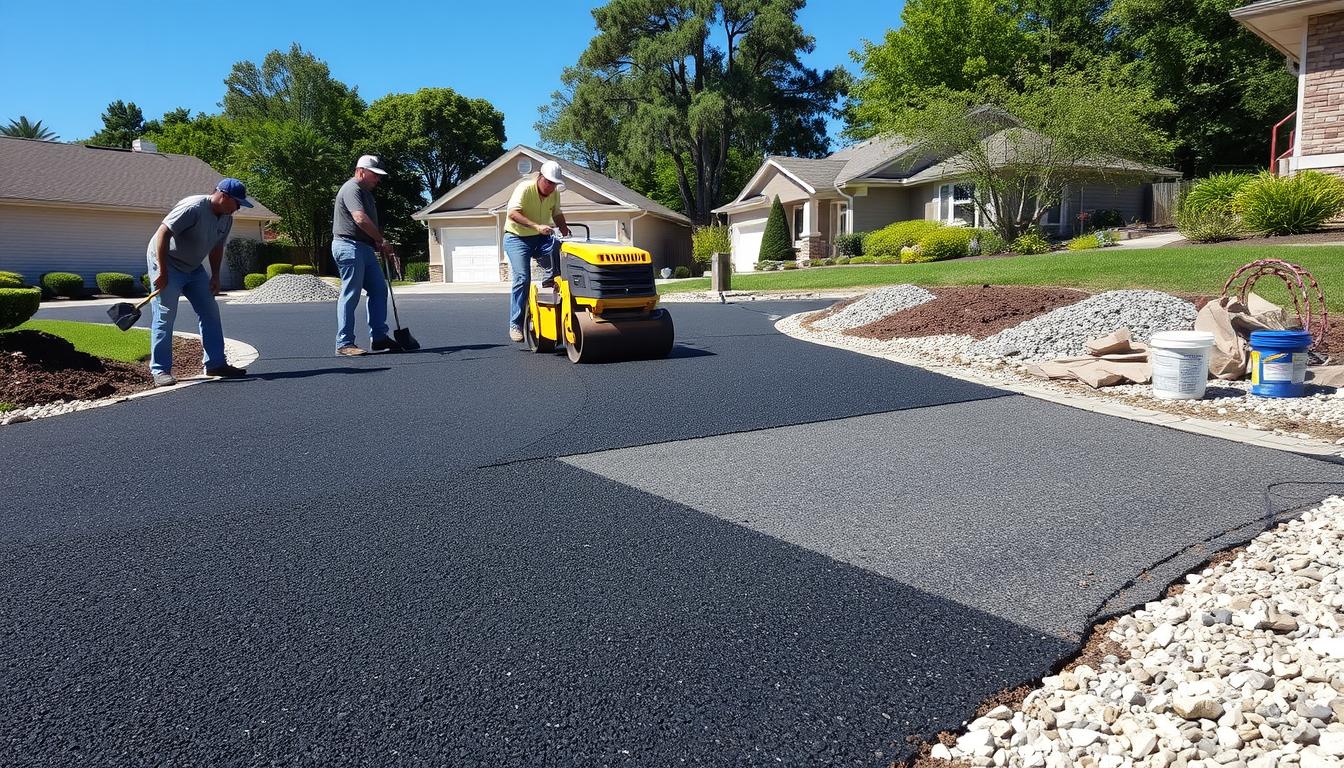If you’ve reached this article, you’re probably wondering, What is the minimum temperature for Asphalt Paving?
We’ve talked about how temperature affects pavement over time. Now, we’ll see why 50 to 90 degrees Fahrenheit is key for asphalt paving. It helps extend its lifespan and improve its quality.
Why Does Temperature Matter When Laying Asphalt?
Temperature is more than just a number when laying asphalt. It’s a key factor that can greatly impact your project. The right temperature is important because it affects how well the asphalt can be shaped and compacted.
At the right temperature, asphalt can be spread and compacted properly. This leads to a strong and quality surface. Knowing the ideal temperature for asphalt paving is vital for any paving project.
Asphalt needs to be malleable enough to spread and compact properly, and the ideal temperature for asphalt paving is key to achieving this consistency.
The Ideal Temperature Range for Laying Asphalt: 50 to 90 Degrees
Why choose this specific range for asphalt paving? Temperatures below 50 degrees Fahrenheit make asphalt hard to work with. Temperatures above 90 degrees make it too fluid, losing its strength.
Risks of Incorrect Temperatures When Laying Pavement
Wrong temperatures can cause many problems when laying asphalt. If it’s too cold, the asphalt won’t compact right. This leads to a weak and uneven surface. It’s important to keep the asphalt at the right temperature to avoid these issues.
Too hot asphalt becomes too fluid. This can cause segregation and deformations in the pavement.
Seasonal Considerations for Asphalt Paving
The season affects asphalt paving a lot. Spring and fall are usually the best times, while summer is too hot and winter is too cold.
Knowing how seasons affect asphalt is key. It helps ensure your pavement lasts longer.
Tips to Consider When Doing Paving Work
Proper Ground Preparation
Before paving, the ground must be prepared well. The soil needs to be level, stable, and dry. Good ground preparation helps keep the asphalt at the right temperature.
Monitor the Temperature for Asphalt Paving
It’s important to watch the temperature during paving. This keeps the asphalt at the best temperature from the plant to the site.
Tools like temperature sensors and thermal cameras help with this.
Advantages of Choosing the Best Conditions Before Laying Pavement
Choosing the right temperature to lay pavement is key for quality, durability, and safety. Here are the main benefits:
- Improved Pavement Quality: The right temperature makes asphalt handling, spreading, and compacting efficient. This results in a strong and even pavement.
- Increased Durability: Paving at the best temperature reduces issues like cracks and potholes. This makes the pavement last longer and need less repairs.
- Long-term Cost Reduction: High-quality and durable pavement means less maintenance and repair costs over time.
- Effective Compaction: The best temperature range ensures the pavement is compacted right. This is key to avoid weak spots and voids.
- Prevention of Installation Problems: Risks like asphalt segregation and uneven surfaces are less likely. This improves both looks and function of the pavement.
- Adaptation to Environmental Conditions: Paving at the right time, considering temperature and humidity, ensures the best conditions for the pavement.
- Improved Safety: High-quality pavement is safer for vehicles and pedestrians. It lowers the risk of accidents.
- Reduction of Viscosity: The right temperature prevents asphalt from being too runny or too hard. This makes it easier to apply and level.
- Prevention of Premature Hardening and Overheating: Keeping the temperature between 50 and 90 degrees prevents asphalt from hardening too fast or becoming too fluid.
- Improved Adhesion: In the ideal temperature range, asphalt sticks better to the base. This is important for a strong installation.
- Increased Pavement Longevity: Paving at the best temperature helps the asphalt last longer. It avoids problems caused by poor installation.
- Optimization of Curing Time: Ideal temperatures help the asphalt cure faster and more efficiently. This allows it to reach its full strength sooner.
Asphalt Paving: Enhancing Infrastructure with Durability and Efficiency
Asphalt paving is a key part of modern infrastructure. It offers durable and efficient solutions for roads, driveways, and parking lots. Its popularity comes from its versatility, cost-effectiveness, and environmental benefits.
History and Evolution
Asphalt has been used for thousands of years, dating back to ancient civilizations. They used natural bitumen for construction. But modern asphalt paving started in the 19th century.
The first modern asphalt pavement was laid in Paris in 1852. This marked a big change in road construction. Over time, asphalt paving techniques and materials have improved a lot. Today, asphalt is the top choice for most road surfaces worldwide.
Key Advantages
Asphalt paving is very durable. It can handle heavy traffic and harsh weather, lasting a long time with little maintenance. It also provides good skid resistance, making roads safer for drivers.
Asphalt is also cost-effective. It’s cheaper to build and install than concrete. Plus, it can be recycled, reducing environmental impact and costs over time.
Environmental Considerations
Asphalt paving is sustainable because it can be recycled. Old asphalt can be crushed and reused in new pavement or as a base layer. This saves natural resources and cuts down on emissions.
Also, new eco-friendly asphalt options like warm-mix asphalt (WMA) have been developed. WMA technology lets asphalt be made and placed at lower temperatures. This reduces energy use, emissions, and greenhouse gases.
Applications and Services
Asphalt paving is used in many ways, including:
- Road Construction: Asphalt roads are key for safe and smooth travel. They are durable and efficient for vehicles.
- Driveways and Parking Lots: Asphalt makes driveways and parking lots durable and easy to maintain. It also looks good.
- Recreational Surfaces: Asphalt is great for sports courts, playgrounds, and trails. It’s smooth, durable, and can handle a lot of use.
At HT Paving, we offer top-notch asphalt paving services, including:
- Pavement Installation: Our team prepares the site, lays down the asphalt, and compacts it. We make sure your pavement is of the highest quality.
- Line Striping: We do precise line striping and pavement markings. This improves safety and traffic flow in parking lots, roads, and recreational areas.
- Sealcoating: Our sealcoating services protect your asphalt from moisture, UV rays, and wear. It makes your pavement last longer and look better.
Conclusion
Asphalt paving is essential for modern infrastructure. It’s durable, cost-effective, and sustainable. With new technology and materials, asphalt paving will keep improving. Trust HT Paving for your asphalt needs and see the quality and expertise we bring.








